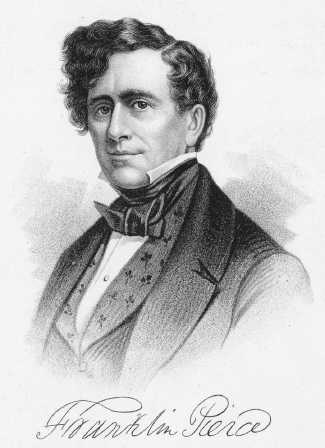72 FRANKLIN
PIERCE.
FRANKLIN
PIERCE.
three sons who were born to them, all now sleep
with their parents in the grave.
In the year 1838, Mr. Pierce, with
growing fame and increasing business as a lawyer, took
up his residence in Concord, the capital of New
Hampshire. President Polk, upon his accession to
office, appointed Mr. Pierce attorney-general of the
United States; but the offer was declined, in
consequence of numerous professional engagements at
home, and the precariuos (sic) state of Mrs. Pierce's
health. He also, about the same time declined the
nomination for governor by the Democratic party. The
war with Mexico called Mr. Pierce in the army.
Receiving the appointment of brigadier-general, he
embarked, with a portion of his troops, at Newport, R.
I., on the 27th of May, 1847. He took an important
part in this war, proving himself a brave and true
soldier.
When Gen. Pierce reached his home in
his native State, he was received enthusiastically by
the advocates of the Mexican war, and coldly by his
opponents. He resumed the practice of his profession,
very frequently taking an active part in political
questions, giving his cordial support to the
pro-slavery wing of the Democratic party. The
compromise measures met cordially with his approval;
and he strenuously advocated the enforcement of the
infamous fugitive-slave law, which so shocked the
religious sensibilities of the North. He thus became
distinguished as a "Northern man with Southern
principles." The strong partisans of slavery in the
South consequently regarded him as a man whom they
could safely trust in office to carry out their
plans.
On the 12th of June, 1852, the
Democratic convention met in Baltimore to nominate a
candidate for the Presidency. For four days they
continued in session, and in thirty-five ballotings no
one had obtained a two-thirds vote. Not a vote thus
far had been thrown for Gen. Pierce. Then the Virginia
delegation brought forward his name. There were
fourteen more ballotings, during which Gen. Pierce
constantly gained strength, until, at the forty-ninth
ballot, he received two hundred and eighty-two votes,
and all other candidates eleven. Gen. Winfield Scott
was the Whig candidate. Gen. Pierce was chosen with
great unanimity. Only four States--Vermont,
Massachusetts, Kentucky and Tennessee--cast their
electoral votes against him. Gen. Franklin Pierce was
therefore inaugurated President of the United States
on the 4th of March, 1853.
His administration proved one of the
most stormy our country had ever experienced. The
controversy between slavery and freedom was then
approaching its culminating point. It became evident
that there was an "irrepressible conflict" between
them, and that this Nation could not long exist "half
slave and half free." President Pierce, during the
whole of his administration, did every thing he could
to conciliate the South; but it was all in vain. The
conflict every year grew more violent, and threats of
the dissolution of the Union were borne to the North
on every Southern breeze.
Such was the condition of affairs
when President Pierce approached the close of his
four-years' term of office. The North had become
thoroughly alienated from him. The anti-slavery
sentiment, goaded by great outrages, had been rapidly
increasing; all the intellectual ability and social
worth of President Pierce were forgotten in deep
reprehension of his administrative acts. The
slaveholders of the South, also, unmindful of the
fidelity with which he had advocated those measures of
Government which they approved, and perhaps, also,
feeling that he had rendered himself so unpopular as
no longer to be able acceptably to serve them,
ungratefully dropped him, and nominated James Buchanan
to succeed him.
On the 4th of March, 1857, President
Pierce retired to his home in Concord. Of three
children, two had died, and his only surviving child
had been killed before his eyes by a railroad
accident; and his wife, one of the most estimable and
accomplished of ladies, was rapidly sinking in
consumption. The hour of dreadful gloom soon came, and
he was left alone in the world, without wife or
child.
When the terrible Rebellion burst
forth, which divided our country into two parties, and
two only, Mr. Pierce remained steadfast in the
principles which he had always cherished, and gave his
sympathies to that pro-slavery party with which he had
ever been allied. He declined to do anything, either
by voice or pen, to strengthen the hand of the
National Government. He continued to reside in Concord
until the time of his death, which occurred in
October, 1869. He was one of the most genial and
social of men, an honored communicant of the Episcopal
Church, and one of the kindest of neighbors. Generous
to a fault, he contributed liberally for the
alleviation of suffering and want, and many of his
towns-people were often gladened (sic) by his material
bounty.

